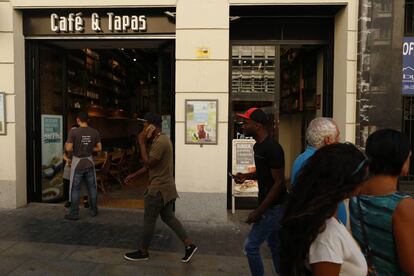Gone with the old rent
Dozens of classic businesses have disappeared from Madrid's city center, some replaced by franchises or clothing store, others still empty

The process was set into motion a while ago: traditional businesses are beginning to disappear from the heart of Madrid, buckling under the pressure of consumer habits now that there are fewer and fewer residents and more and more tourists. The small companies are unable to compete with the exorbitant rent that the big-name stores and franchises can offer. Some of them have endured for many years, protected by automatically renewing “old rent” that applied to contracts signed before 1985 and limited rent increases, thus freezing these prices in time, out of the reach of inflation, and making these business’ rents much cheaper than those of the rest of the modern market. But this, too, came to an end – the Urban Rental Act of 1994 declared that limits would end in January 2015, which meant the end of a good number of traditional shops located in the city center.
The new rent is up to 10 times as much as what tenants were paying before, and some business-owners were already barely scraping by.
The new prices being demanded are unattainable – up to 10 times as much as what they had been paying – for business owners who, in many cases, were already barely scraping by. Left with no other option, they shut up shop or search for other locations with more affordable rent. Now, the clothing store Hernando, founded in the mid-19th century, has been converted into a restaurant owned by Compaía del Trópico, which also owns the bakery that has replaced the enormous souvenir shop Almacenes San Carlos, in the middle of Atocha street. Meanwhile, the spot that was for decades occupied by Bazar Matey, famous among model-train lovers, is now home to a store that falls under the Natura home and clothing brand. Other sites, such as those recently filled by the jewelry shop Asi on Gran Vía, or the antique shop Rústika on San Bernardino, remain empty, waiting for an adequate offer to be made, a deal to close, or renovations to begin
“Once again, the city is turning into a decorated void,” complained Álvaro Bonet, from the Madrid Citizenship and Heritage collective – the same one that warned that the commercial landscape of the city and its very identity would suffer if those antique establishments were forced to leave. Anyone can understand that landlords want the highest return on investment possible for their rental spaces, but the collective insists time and again that the administrative powers must provide much more support for these businesses, some of which are hundreds of years old.
Sign up for our newsletter
EL PAÍS English Edition has launched a weekly newsletter. Sign up today to receive a selection of our best stories in your inbox every Saturday morning. For full details about how to subscribe, click here
The costume jeweler Otera, founded in 1905 and managed by a founder’s granddaughter until a year and a half ago, sold all kinds of vintage adornments: combs, necklaces, pendants, rings, and more. Now it has been replaced by a clothing and accessory store, also vintage, that has maintained the old storefront decorations, which the former tenant Almudena Zarco Otera worried about.
Other emblematic businesses threatened by the end of the “old rent,” like Café Central, have managed to survive. The legendary restaurant and concert venue was able to get a five-year extension, so instead of facing expulsion now, it will have to do so in 2019.
English version by Allison Light.
Tu suscripción se está usando en otro dispositivo
¿Quieres añadir otro usuario a tu suscripción?
Si continúas leyendo en este dispositivo, no se podrá leer en el otro.
FlechaTu suscripción se está usando en otro dispositivo y solo puedes acceder a EL PAÍS desde un dispositivo a la vez.
Si quieres compartir tu cuenta, cambia tu suscripción a la modalidad Premium, así podrás añadir otro usuario. Cada uno accederá con su propia cuenta de email, lo que os permitirá personalizar vuestra experiencia en EL PAÍS.
¿Tienes una suscripción de empresa? Accede aquí para contratar más cuentas.
En el caso de no saber quién está usando tu cuenta, te recomendamos cambiar tu contraseña aquí.
Si decides continuar compartiendo tu cuenta, este mensaje se mostrará en tu dispositivo y en el de la otra persona que está usando tu cuenta de forma indefinida, afectando a tu experiencia de lectura. Puedes consultar aquí los términos y condiciones de la suscripción digital.









































